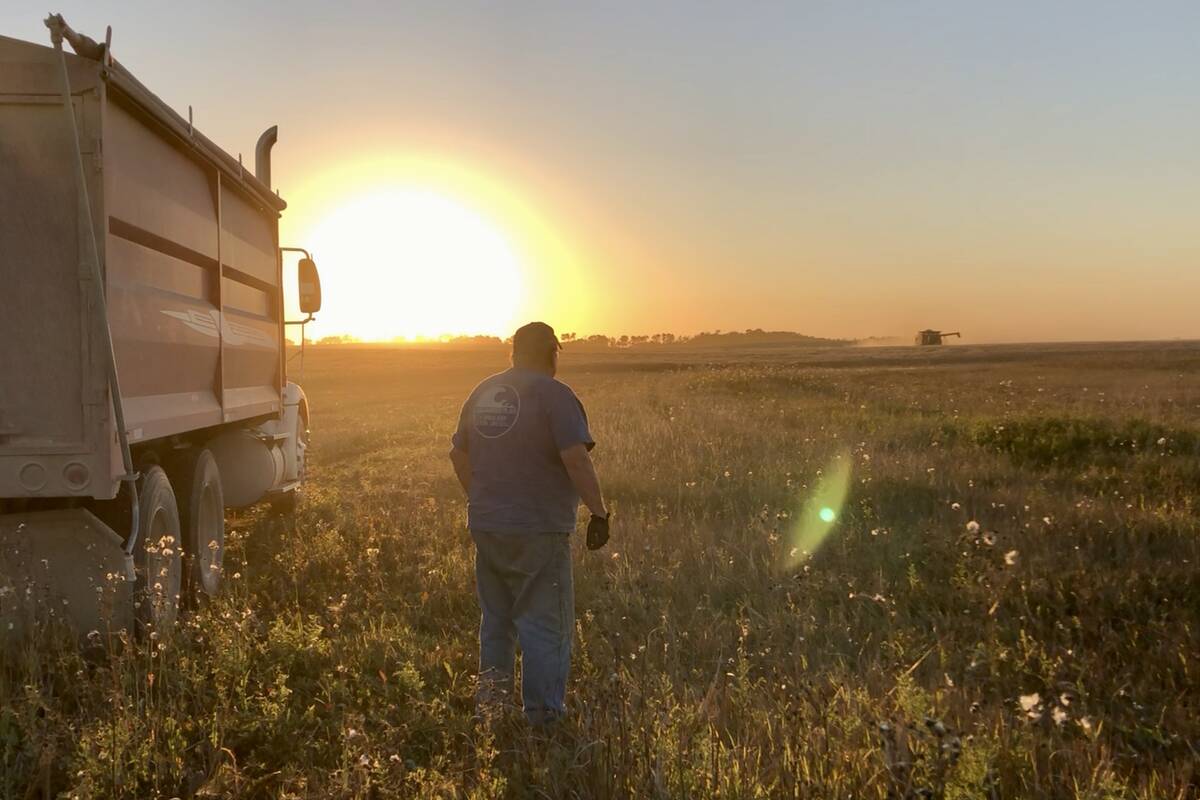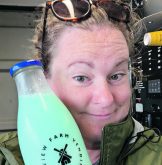Finding suitable child care has always been a challenge. It was especially difficult in the 1950s when married women often did not work outside the home and child-care workers were few.
Louise Hathaway, my mother, trained as a teacher at age 17 and began teaching in a one-room multi-grade school at age 18. In 1945, she married Harold Hathaway.
“I put teaching out of my mind because I thought I’d never do it again. I focused on my family and becoming a farmer’s wife,” she once told me.
Read Also

VIDEO: Bittersweet harvest for this family farmhand
Bruce Burnett helps his brother harvest wheat and canola for the last time on the family farm in Manitoba where they both grew up.
All of that changed in 1956 when an opening came up for a Grade 2 teacher in Marcaine, Alta. At the time, we four children were aged three to 10. My two older sisters were in school but my brother, James, and I were preschoolers.
When the school principal offered the position to Mom over the phone, she turned it down. Later, he came to the house and gave her the blunt truth over tea in her kitchen.
“If you won’t teach Grade 2 in school, you’ll be teaching it to your daughter at home, because I can’t find anyone to fill the vacancy,” he said.
Mom had enjoyed teaching and the prospect was enticing. Our farm was close to town so the drive wouldn’t be a problem. My parents also thought of the year they got hailed out and knew this income would provide a financial cushion if tragedy struck the farm again.

Sheri and James Hathaway as toddlers in Marwayne, Alta. | Hathaway family photos
Mom and Dad also remembered the support they received from their community during their crisis, so teaching was a chance to give back.
Child care for their preschoolers posed a challenge at a time when it was unusual to hire someone.
Dad was available during winter, but not during the growing season, so my parents searched for someone who could come to the farm.
An added challenge was in finding a woman in those days who could drive and had access to a car.
Fortunately, they found a senior who had raised her family and was enjoying a quiet retirement.
I later learned this woman had different ideas about child rearing than my mother. She was strict and often reminded us to be quiet. She must have thought we were two little hellions.
She stayed with us for a short time and then called Mom one evening to give notice.

Harold and Louise Hathaway and their children in 1958. | Hathaway family photos
Until someone else could be found, Dad got up early and worked in the fields until 8 a.m. When Mom came home in the afternoon, he’d take supper with him and work until late at night.
He told me it was the hardest thing he ever had to do and often felt like he was almost asleep on his feet.
Our next caregiver was a young girl who had just graduated from Grade 12. Her home was a distance from ours and she didn’t drive, so she lived with us during the week.
There was a flurry of activity in the house for a few days when men came to carve out a bedroom upstairs. At the time, our upper floor was a big open space with two double beds and a couple of dressers that the four children shared.
We thought the babysitter’s new pink bedroom was spectacular, with a closet, which we didn’t have, door, window and even little shelves.
The shy, quiet babysitter finally arrived, delivered by her boyfriend, with one small suitcase.
I worshipped her but can scarcely remember the days spent with her. I do remember the boyfriend, tall and fun-loving, coming to visit in the evenings.
He positioned himself on a stool in the kitchen while we washed and Mom sat in the dining room marking student work or planning lessons.
He playfully teased me and I was too shy to know how to respond. The best I could do was stay out of the kitchen when he was there. One day, he grabbed me as I came in. Embarrassed, I went limp, closing my eyes and not knowing what to do.
After an awkward pause, he let me go. I never went in the kitchen after that if he was there.
One day the sitter came down the stairs carrying her suitcase. Mom came around the corner and the two stopped suddenly to look at each other .
Looking at the suitcase, Mom asked, “Are you leaving?”
“Yes,” she said, walking through the house as we kids stopped and stared. The house was silent except for the creak of the screen door. Her boyfriend drove up, she got in and we never saw her again.
Once more, Dad handled childcare duties as before.
The next sitter was grey haired and tall and turned out to be my favourite. She was kind and gentle and brought knitting.
When Dad took care of us in winter, I remember we ate a lot of Campbell’s tomato soup or leftovers warmed in the frying pan.
James and I were each other’s daily companions and we didn’t take much notice of or have much contact with the adults in our lives, who were always busy working.
The barn, the bale stack and trees were teeming with dangerous villains, raging wild animals and even unheard of monsters that demanded our immediate attention. We were consumed with the serious business of high adventure, completely oblivious of the real-life drama that swirled around us or that we were the focus of any of it.
Mom taught for two years, stayed home with my brother when I started school, then returned to teaching for the next 29 years until her retirement in 1983.
We never had a caregiver again. We were home alone throughout our school years. The door wasn’t locked during the day so we never had to worry about keys. When Dad was home and not in the fields, we knew he was in his shop repairing machinery or inventing, and he always came in for his afternoon tea and to check on us. The upstairs bedroom became a room for the oldest child or any overnight company.
We learned how to make suppers at an early age as Mom often worked late at school. On Saturdays, we all pitched in to get the house cleaning, laundry and baking done for the week.
Over the years, we became a close-knit family, working together to make sure each job got done. We were always expected to help out if someone else needed it, following our parents’ example as they worked together through each situation that life threw at them.

















